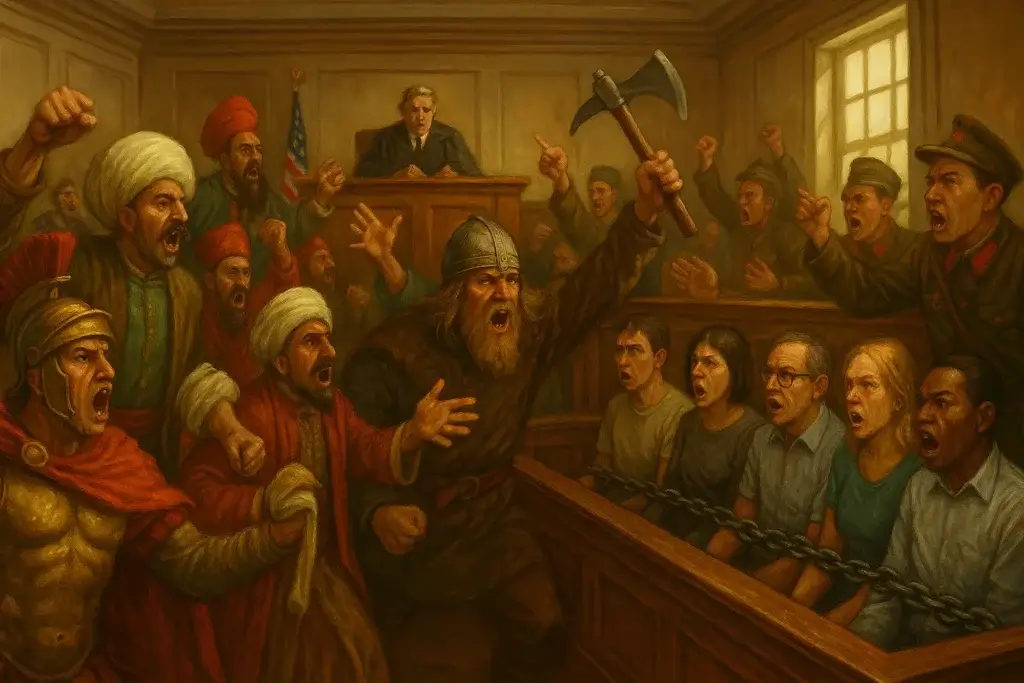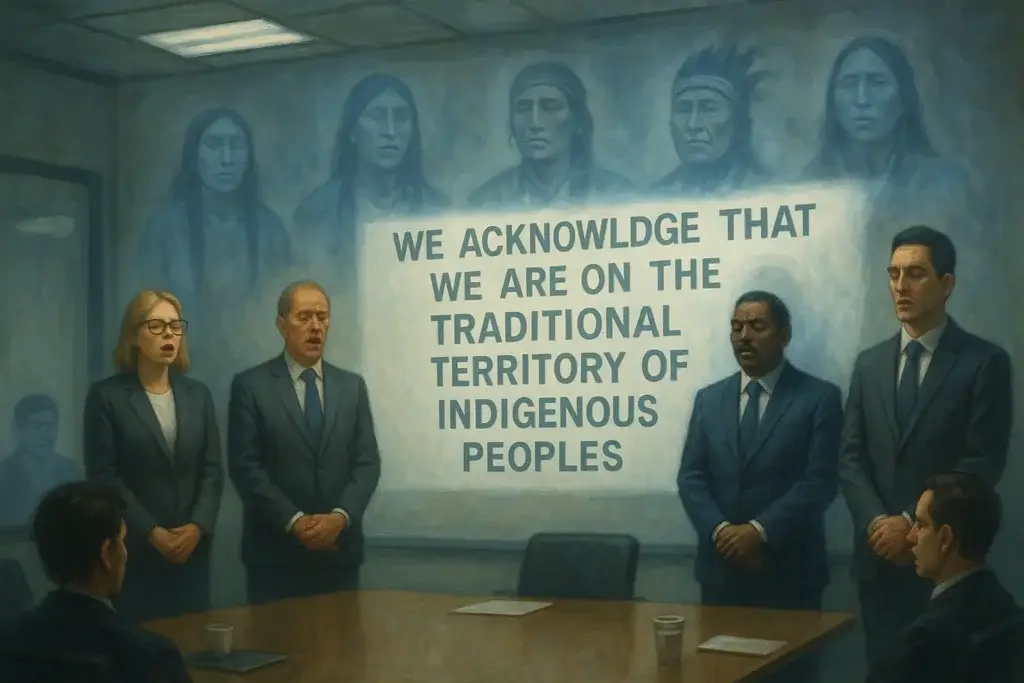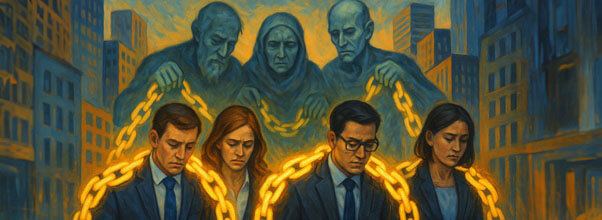One of the most pervasive rhetorical weapons in modern politics is also one of the most dishonest: the appeal to history as a justification for present grievance. At its core, it is an attempt to transform the suffering of the dead into currency for the living. I call it the fallacy of Inherited Suffering.
What the Fallacy Is
The Fallacy of Inherited Suffering occurs when someone argues that because their ancestors endured injustice, they are entitled to recompense, moral authority, or political privilege today. It is not remembrance, which is legitimate, nor historical study, which is necessary. It is a transference—taking wounds from the past and inflating them into present-day claims.

The structure looks like this: “My ancestors were oppressed, therefore I deserve X.” Sometimes the oppression was five decades ago, sometimes five centuries, sometimes two millennia. The time span doesn’t matter. What matters is the sleight of hand: the suffering of one person becomes the grievance of another who never experienced it.
Historical Examples
If I claim that my ancestors were enslaved by the Romans 2,000 years ago and demand reparations, most people would laugh. The empire that enslaved them is gone. The bloodlines have intermixed beyond recognition. No continuity of responsibility exists. Yet the same logic, applied to other historical contexts—slavery in America, colonization in Africa, imperialism in Asia—is treated today as self-evident truth.
Generational Trauma: From Psychology to Politics
Defenders of grievance politics often smuggle in the language of “generational trauma.” Originally a psychological term, it refers to the idea that the effects of trauma can ripple through families—through learned behavior, stress responses, and family dynamics. For example, the children of Holocaust survivors or war refugees may inherit a sense of anxiety or mistrust shaped by their parents’ lived experiences.

But the concept has now been stretched far beyond its legitimate bounds. Activists use “generational trauma” as a moral solvent to dissolve questions of responsibility. If trauma can be passed down through bloodlines, then present grievances can be justified on the basis of ancestral suffering. Thus, someone who never experienced slavery can claim its psychic weight as if it happened yesterday. Someone born a century after colonization can invoke “trauma” as though they themselves had been whipped by overseers or dispossessed by soldiers.
This is where psychology becomes politics. The language of trauma transforms into a tool of entitlement. It is invoked to explain every disadvantage, excuse every failure, and validate every demand. Yet the evidence is weak, and the extrapolation reckless. Trauma may influence families, but it does not travel intact across centuries like a cursed heirloom.
The Collision of Trauma and Politics
By importing the concept of generational trauma into public policy, activists attempt to give scientific cover to the Fallacy of Inherited Suffering. Reparations are framed not only as financial justice but as “healing” for invisible wounds. Land acknowledgments are not merely symbolic gestures but supposed therapies for collective pain. Whole nations are pressured to act as therapists for ghosts.
But politics is not therapy. A government cannot “heal” a people of something they never personally experienced. The attempt merely entrenches grievance and extends victimhood indefinitely. Instead of overcoming history, people are chained to it, their identities fused to trauma that is always remembered but never resolved.
Canadian Case Study: Land Acknowledgments
In Canada, this fallacy has been ritualized. Corporations and universities now recite “land acknowledgments” at meetings, in mission statements, even in commercials. Employees and audiences are compelled to confess that they live and work on “unceded territory.” This has nothing to do with actual ownership—it is theater, an institutional bow to inherited grievance.

Notice the selectivity. No one in France begins a lecture by acknowledging the Norman conquest. No one in Britain pauses to recognize the centuries of Viking raids. Only one grievance is frozen in time and made eternal, because it serves the political aims of today’s elites. It is moral theater masquerading as justice.
No Redemption, Only Permanent Guilt
Another critical flaw of the Fallacy of Inherited Suffering is that it denies the possibility of redemption or growth. By defining entire peoples through the darkest chapters of their past, it freezes identity at the level of ancestral sin. The English are forever colonizers, Americans forever slavers, Europeans forever imperialists.
This is not history; it is caricature. It ignores the moral revolutions that changed civilization. It discards the fact that Christians in England and Europe led the global movement to abolish slavery. It erases the sacrifice of hundreds of thousands of men in the American North who fought and died to end slavery. It overlooks the Royal Navy’s West Africa Squadron, which spent decades at immense cost interdicting slave ships. It disregards civil rights victories, social reforms, and the countless ways nations have sought to correct old wrongs.
Under this fallacy, the moral ledger can never be balanced. The only absolution available is groveling—ritual apologies, land acknowledgments, and massive cash payments that never satisfy because the debt is designed to be eternal.
Such a framework does not heal; it corrodes. It keeps wounds open so they can be exploited. It ensures that reconciliation is impossible, because reconciliation would mean closing the account—and closing the account would mean losing the weapon.
Global Chaos if Universalized
If the Fallacy of Inherited Suffering were applied consistently, the entire globe would collapse into grievance accounting. Every nation, every people, every tribe could demand reparations from someone else. The ledger of history would never close.
- Italians could demand reparations from modern descendants of Germanic tribes who toppled Rome.
- Greeks, Armenians, and Balkan nations could demand compensation from Turkey for centuries of Ottoman conquest, enslavement, and genocide.
- Every Christian in Europe could claim reparations from Islamic states for the millions enslaved and massacred by caliphates and slave raids across the Mediterranean.
- Germans and Poles could demand reparations from Russia for the mass rapes, killings, and deportations inflicted by the Red Army in World War II.
- Russians, in turn, could counterclaim against Germany for the Holocaust and the devastation wrought by Hitler’s invasion.
- Slavs could sue the heirs of the Vikings for centuries of raiding and slave-taking.
- Africans could demand reparations not only from Europeans but also from other African kingdoms who sold them into slavery.

The list is endless because history is endless. Every people has both inflicted and endured suffering. To universalize inherited grievance is to transform the world into a permanent courtroom — one with no judge, no jury, and no possible verdict. It is an ideological trap that chains the living to the crimes of the dead.
No Innocents, No Judge
The most devastating flaw in the Fallacy of Inherited Suffering is that it destroys the very possibility of justice. If trauma can be inherited across generations, then so can bias, resentment, and the will to dominate. Every claimant is also a potential perpetrator, every victim group has at some point wielded power, and every nation has both inflicted and endured conquest.
Who, then, could possibly serve as the judge? If all are implicated by ancestry, no one is innocent. If all carry generational wounds, no one is neutral. Justice collapses into a courtroom with no jury, no standard, and no verdict—only endless counterclaims shouted across centuries.
This is why the logic cannot be universalized. It turns history into a permanent trial where the living are chained to the crimes of the dead, and where no one can ever be acquitted. Far from healing, it guarantees perpetual grievance and unending tribal conflict.
The Marxist Root of the Oppression Narrative
The modern fixation on inherited grievance doesn’t arise in a vacuum. It flows directly from Marxism. Karl Marx framed history as the struggle between oppressors and oppressed, a dialectic in which liberation only comes when the oppressed rise up and seize power. The woke movement has simply extended this framework from economics into culture, race, and identity.
Once you accept the premise that all of history is reducible to oppression, the Fallacy of Inherited Suffering becomes inevitable. Every past injustice becomes a present claim. Every past conqueror becomes a permanent oppressor. Entire peoples are branded with ancestral guilt, while others are canonized as eternal victims.

The unintended consequence is chaos. If oppression is the sole lens of history, then no reconciliation is possible. Every person, group, and nation is forever locked into a binary that cannot be escaped. Even the elites who deploy the framework eventually fall prey to it, condemned by their own categories. This is the poisonous fruit of an odious ideology, and the Fallacy of Inherited Suffering is one of its most destructive mutations.
AI and the Weaponization of History
This fallacy doesn’t just appear in politics. It is now being hard-coded into artificial intelligence itself. Large Language Models, trained on corpora saturated with ideological bias, routinely default to appeals to historical grievance as a way of shutting down lines of inquiry. When an AI claims that a question about immigration, crime, or group differences is “harmful due to a history of discrimination,” it isn’t displaying ethical reasoning — it’s parroting a programmed fallacy.
Elon Musk claims his Grok system was created “to seek the truth.” Yet Grok, like its competitors, often invokes historical grievance and “generational trauma” to sidestep uncomfortable questions. This replaces truth-seeking with safetyism rooted in inherited suffering, turning the machine not into a tool of enlightenment but into a priest of a secular religion of guilt.
Conclusion: Hoisted by Their Own Petards
The Fallacy of Inherited Suffering is not simply a logical error; it is a weapon that backfires. If applied consistently, every group on earth would drown in an endless cycle of claims and counterclaims. Nations would sue one another for conquests centuries old. Descendants of victims would be shown to also be descendants of perpetrators. No one would stand outside the circle of guilt.
That is the irony. The very elites who deploy this fallacy to demand reparations, apologies, and land acknowledgments would themselves be crushed if its logic were universally applied. They are hoisted by their own petards. In seeking to chain others to the crimes of the past, they have proven that no one—not even themselves—can escape history’s shadow.
Scripture itself refutes their doctrine. Ezekiel 18:20 declares: “The soul who sins shall die. The son shall not suffer for the iniquity of the father, nor the father suffer for the iniquity of the son. The righteousness of the righteous shall be upon himself, and the wickedness of the wicked shall be upon himself.” Christianity teaches responsibility for one’s own deeds, and the possibility of redemption. Woke Marxism offers only permanent guilt and endless penance.
The architects of this fallacy seek to make others eternal debtors. They forget that in their own worldview, they are also the descendants of conquerors and slavers. There is no one on earth who does not have both victims and victors in their family tree. Their chosen framework doesn’t elevate them to the judge’s bench; it places them in the dock alongside everyone else.
The only way out of this trap is to reject the premise entirely. We must stand as free men and women, judged by our own character and deeds, respectful of the past but never enslaved by it. Our ancestors’ battles are over. Ours is the task of building a future worthy of their sacrifices, not of endlessly litigating their sins.
—Wolfshead




